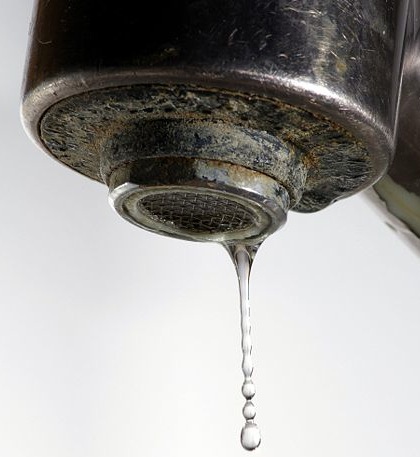 considered a health hazard to humans.
considered a health hazard to humans.Identifying Hard Water
The best way to determine whether or not a home has hard water is to have it tested. For homes served by municipal water systems, you can ask the water supplier about the hardness level of the water they deliver. Private water supplies can be tested for hardness. However, hard water (especially if it is excessively hard) can be detected by inspectors and their clients through the negative effects it has on a home. The most common problems associated with hard water are:
- poor washing machine performance. Clothes washed in hard water often look dingy and feel scratchy or stiff. Continuous laundering in hard water can damage fibers and shorten the lifespan of clothes;
- a mineral ring around the tip of a faucet or in a toilet bowl;
- unsightly, whitish scale deposits in pipes, water heaters, tea kettles, pots, silverware and dishes;
- calcification of taps and shower- heads;
- inefficient and costly operation of water-using appliances. Pipes can become clogged with scale that reduces water flow, ultimately requiring pipe replacement. Crystalline deposits (limescale) have been known to increase energy bills considerably;
- soap curd and scum in washbasins and bathtubs. Bathing with soap in hard water leaves a film of sticky soap curd on the skin, which may prevent removal of soil and bacteria. Soap curd on hair may make it dull, lifeless and difficult to manage. Soap curd also interferes with the return of skin to its normal, slightly acid condition, and may lead to irritation; and
- limescale in solar heating systems. Solar heating, often used to heat swimming pools, is prone to limescale buildup, which can reduce the efficiency of the electronic pump.
Hard Water Concentration Levels
Descriptions of water hardness correspond with ranges of mineral concentrations, as measured below in parts per million (ppm):
| Harness Level |
Concentration of harness minerals in grains per gallon (gpg) |
Milligrams per liter (mg/l) or parts per million (ppm)
|
| Soft |
less than 1 |
less than 17
|
| Slightly Soft |
1 - 3.5 |
17 - 60
|
|
Moderately Hard
|
3.5 - 7
|
61 - 120
|
|
Hard
|
7 - 10.5
|
121 - 180
|
|
Very Hard
|
more than 10.5
|
more than 180
|
Note that since water's acidity and temperature partly determines the behavior of hard water, a single-number scale does not adequately describe the realistic effects of hard water on household components.
Hard Water and Human Health
The World Health Organization reports, " There does not appear to be any convincing evidence that water hardness causes adverse health effects in humans. In contrast, the results of a number of epidemiological studies have suggested that water hardness may protect against disease." The report further states that hard water often contributes a small amount toward total calcium and magnesium human dietary needs.
Geographic Distribution of Hard Water in the U.S.
According to the U.S. Geological Survey, softest waters are in the Pacific Northwest, parts of New England, the South Atlantic-Gulf states, and Hawaii. Moderately hard waters are common in many rivers of Alaska and Tennessee, in the Great Lakes region, and the Pacific Northwest. Hardest waters (greater than 1,000 mg/L) are measured in streams in Texas, New Mexico, Kansas, Arizona and Southern California.
Treatment: Softeners and Conditioners
Water softeners remove unwanted minerals through an ion-exchange process. Incoming hard water passes through a tank of ion- exchange beads that are super-saturated with sodium. The calcium and magnesium ions in the water attach to the resin beads, replacing the sodium, which is then released into the water. The softened water is subsequently distributed for use throughout the house, but it may be unsuitable for drinking due to its high sodium content.
In water conditioners, by contrast, calcium ions remain suspended in the water as small particles, but their tendency to form limescale is diminished. This system allows the benefit that the calcium, which is a good dietary mineral, remains in the water. Water conditioners are more controversial and they do not work in every situation.
International Association of Certified Home Inspectors (InterNACHI) is the world's most elite, non-profit inspection association.
President, ComInspect, www.cominspect.com
Director, Master Inspector Certification Board, www.certifiedmasterinspector.org
Author, 15 books and Co-Host of http://www.NACHI.TV
And a note From Judy: If you have a question about buying or selling a home in Fairfield County, and are in need of an Realtor to represent you, I invite you to contact me, and if you have an idea for a topic that you would like to see on The CT Realty Blog, please include it in the "Post a Comment" section link below this post. We appreciate the feedback and look forward to providing you with the best real estate content, advice and service in Fairfield County, Connecticut.